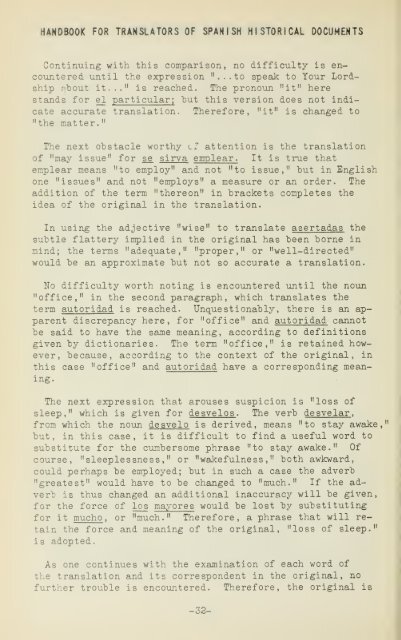Handbook for translators of Spanish historical ... - University Library
Handbook for translators of Spanish historical ... - University Library
Handbook for translators of Spanish historical ... - University Library
Create successful ePaper yourself
Turn your PDF publications into a flip-book with our unique Google optimized e-Paper software.
HANDBOOK FOR TRANSLATORS OF SPANISH HISTORICAL DOCUMENTS<br />
Continuing with this comparison, no difficulty is encountered<br />
until the expression "...to speak to Your Lordship<br />
sbout it..." is reached. The pronoun "it" here<br />
stands <strong>for</strong> el particular; hut this version does not indicate<br />
accxirate translation. There<strong>for</strong>e, "it" is changed to<br />
"the matter."<br />
The next obstacle worthy ci" attention is the translation<br />
<strong>of</strong> "may issue" <strong>for</strong> se_ sirva emplear. It is true that<br />
emplear means "to employ" and not "to issue," hut in English<br />
one "issues" and not "employs" a measure or an order. The<br />
addition <strong>of</strong> the term "thereon" in brackets completes the<br />
idea <strong>of</strong> the original in the translation.<br />
In using the adjective "wise" to translate asertadas the<br />
subtle flattery implied in the original has been borne in<br />
mind; the terms "adequate," "proper," or "well-directed"<br />
would be an approximate but not so accurate a translation.<br />
No difficulty worth noting is encountered until the noun<br />
"<strong>of</strong>fice," in the second paragraph, which translates the<br />
term autoridad is reached. Unquestionably, there is an apparent<br />
discrepancy here, <strong>for</strong> "<strong>of</strong>fice" and autoridad cannot<br />
be said to have the same meaning, according to definitions<br />
given by dictionaries. The term "<strong>of</strong>fice," is retained however,<br />
because, according to the context <strong>of</strong> the original, in<br />
this case "<strong>of</strong>fice" and autoridad have a corresponding meaning.<br />
The next expression that arouses suspicion is "loss <strong>of</strong><br />
sleep," which is given <strong>for</strong> desvelos . The verb desvelar .<br />
from which the noun desvelo is derived, means "to stay awake,"<br />
but, in this case, it is difficult to find a useful word to<br />
substitute <strong>for</strong> the cumbersome phrase "to stay awake." Of<br />
course, "sleeplessness," or "wakefulness," both awkward,<br />
could perhaps be employed; but in such a case the adverb<br />
"greatest" would have to be changed to "much." If the adverb<br />
is thus changed an additional inaccuracy will be given,<br />
<strong>for</strong> the <strong>for</strong>ce <strong>of</strong> los mayor es would be lost by substituting<br />
<strong>for</strong> it mucho, or "much." There<strong>for</strong>e, a phrase that will retain<br />
the <strong>for</strong>ce and meaning <strong>of</strong> the original, "loss <strong>of</strong> sleep."<br />
is adopted.<br />
As one continues with the examination <strong>of</strong> each word <strong>of</strong><br />
the translation and its correspondent in the original, no<br />
further trouble is encoimtered. There<strong>for</strong>e, the original is<br />
-32-










![Novellen [microform] - University Library](https://img.yumpu.com/21939450/1/171x260/novellen-microform-university-library.jpg?quality=85)
![Anecdota Chisiana de re metrica [microform]](https://img.yumpu.com/21939448/1/190x239/anecdota-chisiana-de-re-metrica-microform.jpg?quality=85)



![Schollenbruch [microform] : Gedichte - University Library](https://img.yumpu.com/21939437/1/174x260/schollenbruch-microform-gedichte-university-library.jpg?quality=85)

